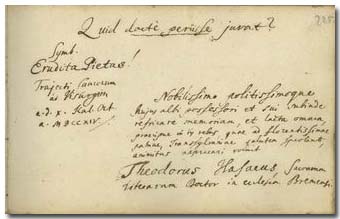
Quid doctè periisse juvat?
Symb[olum]. Erudita Pietas!
Trajecti Caucorum ad Visurgim a. d. X. Kal. Oct. a. MDCCXIV.
Nobilissimo politissimoque hujus albi possessori et sui subinde
refricare memoriam, et laeta omnia, praecipue in iis rebus, quae
ad florentissimae patriae, Transsylvaniae salutem spectant,
animitus apprecari voluit
Theodorus Hasaeus, Sacrarum Literarum Doctor in Ecclesia Bremensi. |
|
What is it worth to die erudite?
Motto: Erudite piety!
In Bremen, the 10th day before the calends of
October, 1714
To the noble and erudite owner of this album,
both for a later refreshing of his memory, and as a token of my
best wishes, especially respecting the well-being of his beautiful
homeland, Transylvania:
Theodorus Hasaeus, doctor of theology and
pastor of the church of Bremen
|
p. 225.
Bremen, September 22, 1714
Hase, Theodor von
(1682-1731), German Reformed
theologian
Theodor von Hase was born in Bremen on November
30, 1682, a son of the theologian Cornelius von Hase (1653-1710)
and of Sara Wolters
(?-1710); his mother was also renowned of her theological and
Hebrew knowledge. Theodor studied in the high school of Bremen,
where in 1701, at the age of 19 he accomplished a theological
dispute under the chairmanship of his father. In 1702 he went to
Hessen, then to Kassel and Marburg, and with a second dispute he
obtained pastoral diplom. After further studies at the academies
and universities of Hanau, Herborn, Duisburg, Utrecht, Leiden and
other places, he returned to Bremen, and there he became assistant
pastor of the Liebfrauenkirche. In 1707 he was professor of
biblical philology and classical literature in Hanau. In 1708 he
became preacher in the same church of Bremen, and professor of
Hebrew in the local high school. In 1712 in Frankfurt an der Oder
he was granted – in his absence, on the basis of a treatise of him
– doctoral degree in theology, and in 1723 he was appointed
professor of theology at the university of Bremen. He was also
invited to Franeker, but remained in Bremen. From 1718 he was
member of the Scientific Society of Berlin. From 1729 on he
suffered a series of strokes. He died in Bremen on February 25,
1731. Between 1719 and 1727 he continued in Bremen the series Bibliotheca
historico-philologico-theologica, which had been started in
Amsterdam. Our Library preserves, among others, his dissertation De oraculo Lamechi (Bremen, 1712).
His shorter historical, exegetic, dogmatic and other theological
works and inaugural addresses were collected and published after
his death: Dissertationum
et observationum philologicarum sylloge. Bremen, 1731.
Theodor
von Hase, just like Gottfried Jüngst (p. 216),
uses the ancient name of Bremen in the dating: Trajectum Caucorum ad
Visurgim, that is, the ford of the ancient German tribe of Cauci
over the Weser (Visurgis).
• ADB •
Jöcher |

